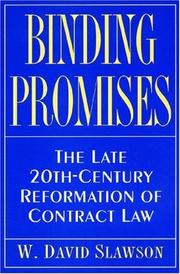| Listing 1 - 10 of 1173 | << page >> |
Sort by
|
Book
ISBN: 0191731714 0191029645 0191018457 9780191731716 9780191029646 9780199606627 0199606625 Year: 2011 Publisher: Oxford : Oxford University Press,
Abstract | Keywords | Export | Availability | Bookmark
 Loading...
Loading...Choose an application
- Reference Manager
- EndNote
- RefWorks (Direct export to RefWorks)
The emergence of a pan-European contract law is one of the most significant legal developments in Europe today. The Emergence of EU Contract Law: Exploring Europeanization examines the origins of the discipline and its subsequent evolution. It brings the discussion up-to-date with full analysis of the debate on the Common Frame of Reference and the future that this ambiguous instrument may have in the contemporary European legal framework.One of the central themes of the book is exploration of the multi-level, open architecture of the EU legal order, and the implications of that architecture f
Book
ISBN: 9352801792 1282503227 9786612503221 8132104781 9788132104780 9781282503229 9788132102236 8132102231 9789352801794 661250322X Year: 2009 Publisher: Los Angeles SAGE
Abstract | Keywords | Export | Availability | Bookmark
 Loading...
Loading...Choose an application
- Reference Manager
- EndNote
- RefWorks (Direct export to RefWorks)
Law of Business Contracts in India brings together in-depth, wide-ranging articles by legal experts in the area of business contracts. It focuses on the modern forms of business contracts and exposits on the historical evolution, judicial interpretation and future applications of such contracts. The articles bridge the gap between the theoretical understanding of contract law and its practical orientation, need, relevance and challenges. The key features of the volume are:. - Comprehensive coverage of modern laws on contract formation. - Discussion on the relevance of international laws in the
Book
ISBN: 9788892160101 8892160109 Year: 2017 Publisher: Torino G. Giappichelli
Abstract | Keywords | Export | Availability | Bookmark
 Loading...
Loading...Choose an application
- Reference Manager
- EndNote
- RefWorks (Direct export to RefWorks)
Book
ISBN: 1283382261 9786613382269 1854187244 9781854187246 9781854187024 Year: 2010 Publisher: London Thorogood
Abstract | Keywords | Export | Availability | Bookmark
 Loading...
Loading...Choose an application
- Reference Manager
- EndNote
- RefWorks (Direct export to RefWorks)
When you sit down to draft a contract there are multiple issues to consider. This briefing assesses all the latest legislation and case law and highlights best practice drafting techniques. You will also find crystal-clear explanations and guidelines to a host of case studies illustrating the law and its application.

ISBN: 1282708767 9786612708763 9888052144 9789888052141 9789622098657 9622098657 Year: 2007 Publisher: Hong Kong Hong Kong University Press
Abstract | Keywords | Export | Availability | Bookmark
 Loading...
Loading...Choose an application
- Reference Manager
- EndNote
- RefWorks (Direct export to RefWorks)
Contract Law in Hong Kong is the first comprehensive textbook on this topic for more than ten years. The 16 chapters of the book use case studies to cover all basic contract concepts in a reader-friendly style. Particular emphasis is placed on what makes Hong Kong law different from other common law jurisdictions. Attention is drawn throughout to the continuing significance of English case law in Hong Kong. Emphasis is also placed on the substantial similarity in many areas between English and Hong Kong legislation and there is a useful 'cross-referencing' glossary.The book deals with all the
Book
ISBN: 1509914285 1509914269 9781509914296 1509914293 9781509914289 1509914277 9781509914272 9781509914265 9781509914272 9781509914265 Year: 2017 Publisher: Oxford, UK ; Portland, Oregon : Hart Publishing,
Abstract | Keywords | Export | Availability | Bookmark
 Loading...
Loading...Choose an application
- Reference Manager
- EndNote
- RefWorks (Direct export to RefWorks)
This book presents, analyses and evaluates the Principles of Latin American Contract Law (PLACL), a recent set of provisions aiming at the harmonisation of contract law at a regional level. As such, the PLACL are the most recent exponent of the many proposals for transnational sets of 'principles of contract law' that were drafted or published over the past 20 years, either at the global or the regional level. These include the UNIDROIT Principles of International Commercial Contracts, the Principles of European Contract Law, the (European) Draft Common Frame of Reference and the Principles of Asian Contract Law. The PLACL are the product of a working group comprising legal academics from Argentina, Brazil, Colombia, Chile, Paraguay, Uruguay and Venezuela. The 111 articles of the instrument deal with problems of general contract law, such as formation, interpretation and performance of contracts, as well as remedies for breach. The book aims to introduce the PLACL to an international audience by putting them in their historical and comparative context, including other transnational harmonisation measures and initiatives. The contributions are authored by drafters of the PLACL and contract law experts from Europe and Latin America
Book
ISBN: 9780674241985 0674241983 9780674237599 0674237595 0674241991 Year: 2019 Publisher: Cambridge, MA : Harvard University Press,
Abstract | Keywords | Export | Availability | Bookmark
 Loading...
Loading...Choose an application
- Reference Manager
- EndNote
- RefWorks (Direct export to RefWorks)
Legal thinkers typically justify contract law on the basis of economics or promissory morality. But Peter Benson takes another approach. He argues that contract is best explained as a transfer of rights governed by a conception of justice. The result is a comprehensive theory of contract law congruent with Rawlsian liberalism.
Contracts --- Contracts.

ISBN: 0691044155 9786612752407 1400821967 1282752405 1400813433 9781400813438 9780691044156 9781282752405 6612752408 9781400821969 1400807441 140080745X Year: 1996 Publisher: Princeton, New Jersey: Princeton university press,
Abstract | Keywords | Export | Availability | Bookmark
 Loading...
Loading...Choose an application
- Reference Manager
- EndNote
- RefWorks (Direct export to RefWorks)
During its classical period, American contract law had three prominent characteristics: nearly unlimited freedom to choose the contents of a contract, a clear separation from the law of tort (the law of civil wrongs), and the power to make contracts without regard to the other party's ability to understand them. Combining incisive historical analysis with a keen sense of judicial politics, W. David Slawson shows how judges brought the classical period to an end about 1960 with a period of reform that continues to this day. American contract law no longer possesses any of the prominent characteristics of its classical period. For instance, courts now refuse to enforce standard contracts according to their terms; they implement the consumer's reasonable expectations instead. Businesses can no longer count on making the contracts they want: laws for certain industries or for businesses generally set many business obligations regardless of what the contracts say. A person who knowingly breaches a contract and then tries to avoid liability is subject to heavy penalties. As Slawson demonstrates, judges accomplished all these reforms, although with some help from scholars. Legislation contributed very little despite its presence in massive amounts and despite the efforts of modern institutions of law reform such as the Conference of Commissioners on Uniform State Laws. Slawson argues persuasively that this comparison demonstrates the superiority of judge-made law to legislation for reforming private law of any kind.
Book
ISBN: 9789004414761 9004414762 9004414789 9789004414785 Year: 2020 Publisher: Leiden Boston Brill | Nijhoff
Abstract | Keywords | Export | Availability | Bookmark
 Loading...
Loading...Choose an application
- Reference Manager
- EndNote
- RefWorks (Direct export to RefWorks)
"The modern Chinese law and legal system, though bearing strong resemblance to the civil law heritage, are in fact in an evolving stage without a definite model of tradition. After the fall of the last emperor in 1911, China experienced nearly forty years of warlord chaos, the anti- Japanese war, and then civil law"
Contracts --- Contracts - China --- Chine
Book
ISBN: 9781009396059 1009396056 1009396099 9781009475952 9781009396073 1009396072 1009475959 9781009396080 1009396080 9781009396097 Year: 2024 Publisher: Cambridge : Cambridge University Press,
Abstract | Keywords | Export | Availability | Bookmark
 Loading...
Loading...Choose an application
- Reference Manager
- EndNote
- RefWorks (Direct export to RefWorks)
Why are contracts incomplete? Transaction costs and bounded rationality cannot be a total explanation since states of the world are often describable, foreseeable, and yet are not mentioned in a contract. Asymmetric information theories also have limitations. We offer an explanation based on 'contracts as reference points'. Including a contingency of the form, 'The buyer will require a good in event ', has a benefit and a cost. The benefit is that if occurs there is less to argue about; the cost is that the additional reference point provided by the outcome in can hinder (re)negotiation in states outside. We show that if parties agree about a reasonable division of surplus, an incomplete contract is strictly superior to a contingent contract. If parties have different views about the division of surplus, an incomplete contract can be superior if including a contingency would lead to divergent reference points.
| Listing 1 - 10 of 1173 | << page >> |
Sort by
|

 Search
Search Feedback
Feedback About UniCat
About UniCat  Help
Help News
News